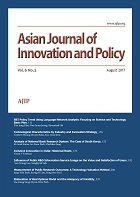Analysis of National Basic Research System: The Case of South Korea
So-Yeon Park (Innopolis Foundation, Department of Future and Strategy)
장덕희 (한국해양과학기술원)
Abstract
In this paper, we analyze the basic research system in South Korea. We propose a national basic research system consisting of value, openness, input, transformation, and output. Based on this framework, we set up interview questionnaires, and 15 key informants have been interviewed. According to our results, first, in terms of value, basic research is recognized as an activity for creating knowledge in the understanding of nature. Second, as for openness, scientists and policy experts agree that active interaction with the global community is an important value for the national research system. Third, in terms of sustainable research resources, scientists are strongly required to effectively allocate research funding, maximizing the creativity of researchers and the efficient sharing of research equipment. Fourth, in transformation, basic researchers maintain that the Korean research system has is extremly dependent on the government’s external control, and its self-regulative system has been weak for over half century onw. Fifth, for global competitiveness, the interviewees agreed that the quality of basic research in Korea is approaching that of its global competitors. Finally, we put forward some policy implications on the basis of these findings.
- keywords
- Basic Research, scientific values, openness, sustainability, autonomy, South Korea
참고문헌
Bernal, J.D. (1939) The Social Function of Science, Routledge.
Kim, S.S. et al. (2016) A Study on the ‘Basic Research 2.0 Strategy’ for the Convergence and Synergy, The Ministry of Science, ICT and Future planning.
Khun, T.S. (1962) The Structure of Scientific Revolutions, Chicago and London: University of Chicago Press.
Yin, R. (2009) Case Study Research: Design and Methods, Sage Publications.
- 다운로드 수
- 조회수
- 0KCI 피인용수
- 0WOS 피인용수


